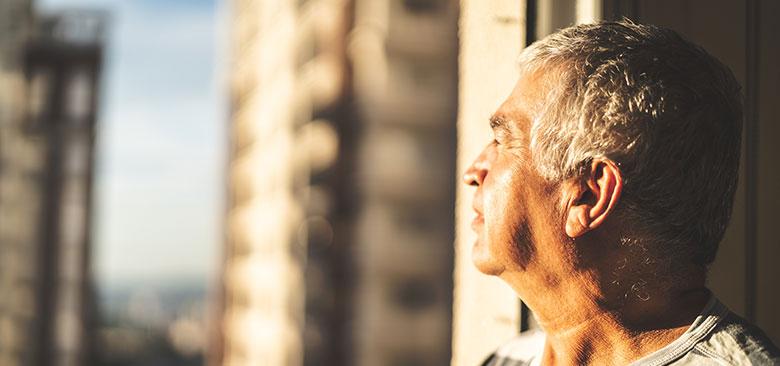
Researchers at the UCSF School of Nursing are developing studies to learn more about the virus, especially its impact on vulnerable populations.
How Vulnerable Populations Are Coping with COVID-19
The coronavirus pandemic has caused one of the worst global health crises in history. Researchers at the UCSF School of Nursing are developing studies to learn more about the virus, especially its impact on vulnerable populations. Here are examples of School of Nursing faculty adapting ongoing studies to examine the effects of COVID-19.
“Living in Chronic Uncertainty”
A major focus of research for assistant professor Elena Portacolone and Julene Johnson, professor and associate dean of research, is studying older adults who live alone and have cognitive impairment. These individuals experience feelings of isolation and anxiety because of their living situation and cognitive state.
The California shelter-in-place and social distancing orders in response to the pandemic could amplify those feelings, resulting in worse physical and psychological health outcomes.
“It’s really important to understand how they’re doing because the participants we’re talking about are individuals who are extremely at risk,” Portacolone said.  Elena Portacolone
Elena Portacolone
Their ongoing study involves 69 participants from the Bay Area who are over age 55. The diverse group includes African American, Asian, Latinx and white participants – some of whom are bilingual while others speak only Cantonese or Spanish. The participants have either a diagnosed cognitive impairment, such as early onset Alzheimer’s or dementia, or scored low on the Montreal Cognitive Assessment, a test that screens for cognitive impairment. The researchers are conducting follow-up interviews with 20 to 25 participants to learn the effects from the pandemic.
“One of the main findings of our research is that these people live very precarious lives even without the pandemic,” Portacolone said. “They’re struggling at many levels, living in chronic uncertainty. Now I’m scared to understand how much worse the uncertainty has become because of the pandemic.”
Johnson is interested in learning if the participants use coping mechanisms to deal with the stress and uncertainty the pandemic is causing. Conversely, she’s curious if cognitive impairment is potentially benefitting this group, decreasing stress because they are not in tune to the magnitude of the crisis.
 Julene Johnson “They may have developed strategies to connect with other people and know of resources that can help them cope with these challenging times,” Johnson said. “But it’s harder now because group activities, like attending senior center functions, are virtually impossible. People with cognitive impairment are not going to be able to access those tools as easily.”
Julene Johnson “They may have developed strategies to connect with other people and know of resources that can help them cope with these challenging times,” Johnson said. “But it’s harder now because group activities, like attending senior center functions, are virtually impossible. People with cognitive impairment are not going to be able to access those tools as easily.”
What future hurdles this population encounters are also of interest. For example, they’ll inquire if there are barriers that would keep these participants from accessing a COVID-19 vaccine if and when it is available. Portacolone said she is especially concerned about the study’s African American participants because she said there is a “strong body of literature” suggesting that African Americans are reluctant to take vaccines. She said it will be interesting to learn if the African Americans in this study replicate that behavior.
Portacolone, Johnson and their team began conducting follow-up interviews in mid-April and those interviews will continue throughout May. They hope to submit their findings for publication by the end of July.
The LGBTQ+ Community and COVID-19
Another group that could experience disproportionate health outcomes due to the coronavirus pandemic is the LGBTQ+ community. These individuals already experience undue stress and discrimination in health care settings and the pandemic will add further strain, said UCSF School of Nursing assistant professor Annesa Flentje.
“Unfortunately, this is a situation in which the poor get poorer and health and economic disparities are really exacerbated,” she said.  Annesa Flentje
Annesa Flentje
Flentje is examining these potential effects via The PRIDE Study, a large-scale, national longitudinal study of LGBTQ+ individuals and other gender and sexual minorities that has almost 18,000 enrolled participants. Flentje serves as the project’s associate director and UCSF site director.
As the coronavirus outbreak intensified, Flentje, along with The PRIDE Study Co-director Mitchell Lunn from Stanford University, sent two surveys to PRIDE participants. The first survey focuses on the impacts of the coronavirus on mental health, behavior, and social interactions, and has received more than 2,800 responses as of mid-April. The second survey assesses the experiences of LGBTQ+ individuals who were treated in health care settings for respiratory illness, and has garnered more than 900 responses so far.
“We’ve already seen with COVID-19 that some populations are being impacted more,” Flentje said. “There are concerns the LGBTQ+ population is going to be more impacted due to higher rates of chronic illness and higher rates of smoking that are risk factors as they relate to COVID-19. We want to be able to document these so we can do something about it.”
The LGBTQ+ population is also more at risk during the pandemic because these individuals experience higher rates of mental health issues and substance use and are more likely to work in industries impacted by COVID-19.
“Even for people without mental health problems, this situation is extremely difficult,” Flentje said. “It’s difficult to feel good when you’ve removed everything that makes you feel good, and you need to find other ways to accommodate that.”
Another key aspect is examining what messages and sources of messaging are most successful in encouraging behavior that promotes public health. For example, the survey asks if an individual is self-isolating, and whether the individual would self-isolate more or less depending on whom the message comes from.
“Are different sources of information more trusted?” Flentje asked. “If we need to send out a health message and it’s not effective coming from a government figure, would it be more effective coming from somebody within the community?”
The researchers are already preparing papers based on their findings that could be released in a matter of weeks. Because this is a longitudinal study, the researchers will be able to track the mental and physical health of the participants for years to come and determine if the pandemic has lasting effects.
“LGBTQ+ communities have been left out of most national survey efforts so we don’t know much longitudinally about the health of these communities,” Flentje said. “We’re trying to fill gaps in understanding the health of sexual and gender minority people and there are a lot of gaps to fill. We have a lot of work to do.”



